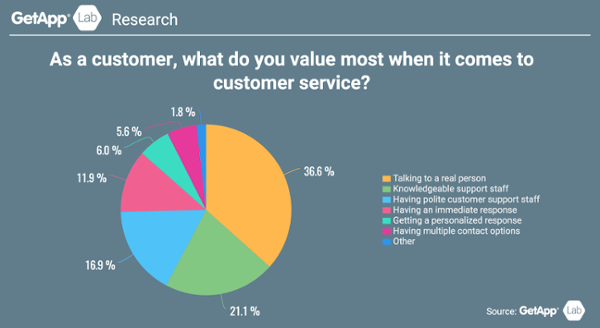Despite the growing popularity of instant-messaging support and “conversational agents”—better known as chatbots—actually talking to a customer on the phone is one of the best ways to engage in a real conversation and learn more about a customer’s problems.
Done right, such conversations can be helpful, valuable, and even fun. But we don’t tend to hear about those interactions. Instead, we usually hear horror stories of automated switchboards, interminable wait times, and disinterested customer support staff.
If you have read psychology books I’m sure you have learned various new stuff but nothing comes close to practical experience.
Everybody has a terrible story about customer support. Whether it’s waiting on hold for three hours to speak with someone at the IRS, having to explain a problem repeatedly to one support rep after another, or dealing with random disconnections in the middle of crucial support calls, we’ve been conditioned to accept that customer support is a uniquely terrible experience to be endured rather than a satisfying, rewarding part of patronizing a business.
According to data from GetApp Lab, all that most customers want from a support experience is to speak with a real live human being. That’s it.
[Source]
It’s no secret why a majority of customers want to speak with a real person during support calls. It’s one of the best channels for quickly identifying and solving complex customer problems. When we really understand where our customers are coming from, it’s much easier to solve their problems and build trust.
Why Customers Dread Calling Customer Support Numbers
If speaking with a customer support rep is so effective, then why do so many people dread the thought of picking up the phone and calling an 800 number to speak with one?
On average, American consumers spend around 30 hours every year on the phone with customer support personnel. Because we spend so much time on these calls, we already have preconceived notions about how the entire experience will play out. We’re already on the defensive before we even finish dialing, which becomes a self-fulfilling prophecy.
Although many consumers have legitimate grievances with telephone-based customer support, most of the negativity surrounding these calls is rooted in the perception that companies don’t respect customers’ time. Calling a customer support line isn’t just a pain in the ass—it’s often a considerable investment of time that prevents customers from doing other things. Even if there’s a very good reason for a lengthy wait to speak with a support rep, every minute a customer wastes waiting on hold damages that company’s brand. It creates negative perceptions about that company that can be very difficult to undo, even if the actual support call goes well.
These experiences also play a significant role in whether a customer will even attempt to contact customer support in the first place. It doesn’t matter how skilled, knowledgeable, or friendly your support reps are if your customers don’t even want to pick up the phone.
Customer Support Is a Critical Competitive Advantage
Instead of treating customer support as an afterthought, think of it as a way to further differentiate yourself from the competition. Talking through an issue with a customer over the phone allows you to get to the heart of the problem—and ultimately solve it—much faster, but it’s also a unique opportunity to strengthen the relationship with the customer and create a positive association with your brand.
The better the customer support experience, the more positive the association—a crucial competitive advantage in any industry.
However, before you can deliver a world-class customer support experience, it’s important to understand why your customer chose to call you in the first place. Customers who prefer phone support are often looking for:
- Quick solutions to complex problems. Voice support allows your support reps to ask detailed, probing questions and guide customers through the support process in real time. Even relatively minor issues like password resets can be solved much faster in a simple phone conversation, as opposed to instant messaging or chatbot support.
- A more intimate, personal experience. Voice support isn’t just effective; it’s also a way to provide the kind of personalized white-glove service your tired, stressed-out customers crave. The more difficult the problem, the more your customers will appreciate attentive customer support.
- Difficult conversations. Even customers who are furious still want their problems to be acknowledged. Voice support is ideal for customers who want—or even need—to vent their frustrations. The immediacy of voice support helps the customer feel as though their voice is being heard and gives your reps the opportunity to calmly walk customers through the solution they want.
It’s vital to understand the mindset of the customers who choose voice support over other channels. The needs of a customer who chooses to pick up the phone to speak with a rep are very different from those of a customer who opts to utilize live chat. Similarly, customers who favor email support aren’t likely to need as prompt a response as someone who calls your support team.
Understanding the differences in the needs of customers who choose different support channels is the first step in creating better, more rewarding support experiences. Likewise, considering the frame of mind a customer is likely to be in during a support call allows your reps to preemptively address problems before they arise and alleviate the frustrations of the caller.
The biggest challenge to overcome for voice support personnel is the negativity surrounding perceptions of voice support itself. A little understanding goes a long way, and by demonstrating empathy with customers and proving that you genuinely value their time, you can prove that customer support is a crucial part of your entire business, not merely an afterthought.
Give Your Customers the Support They Deserve
Your customers don’t just expect you to provide best-in-class support experiences when things go wrong—they also need to be understood and met where they are. Voice support is one of the most effective ways to solve your customers’ problems, but only if your reps understand where your customers are coming from long before the phone rings.
Great customer support isn’t just about solving problems; it’s also about building relationships, strengthening your brand, and helping people feel that their time is as valuable to you as their business.




